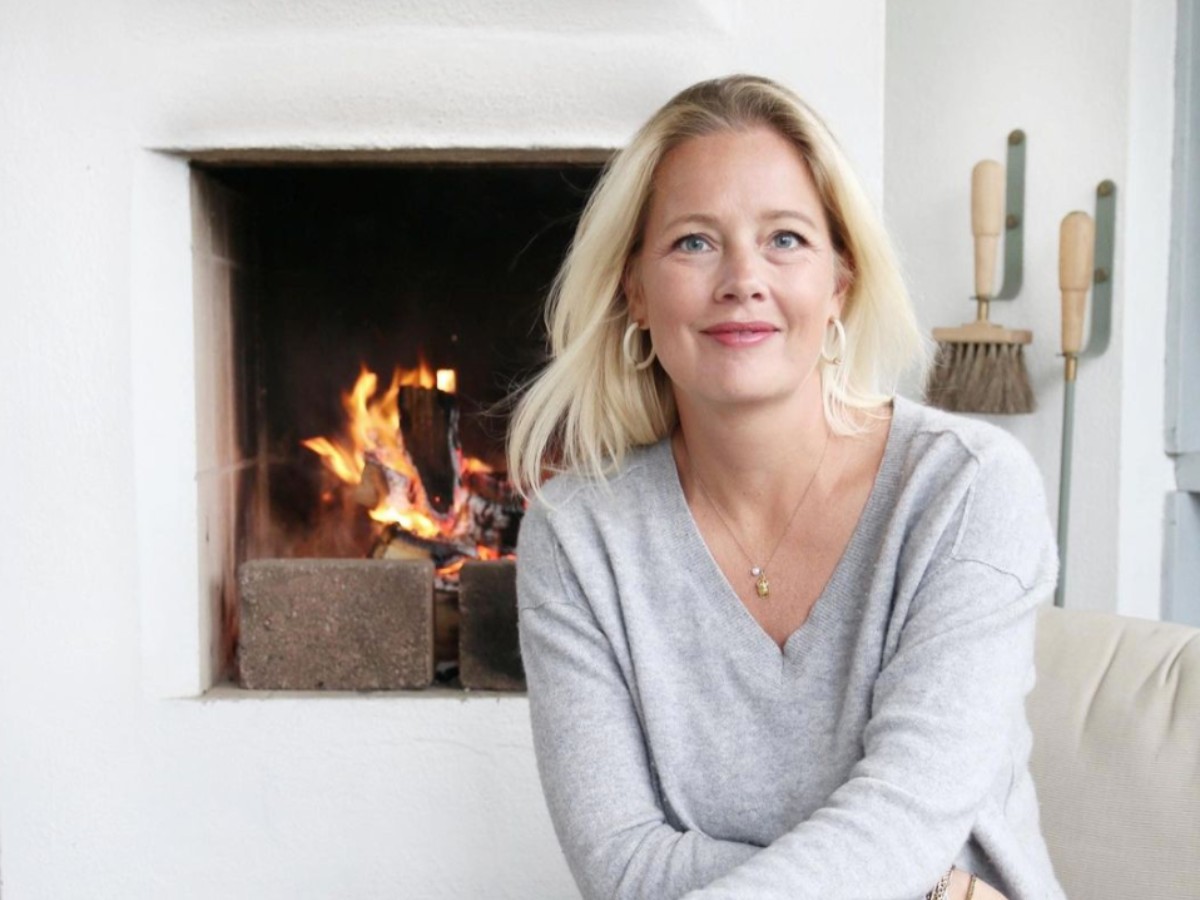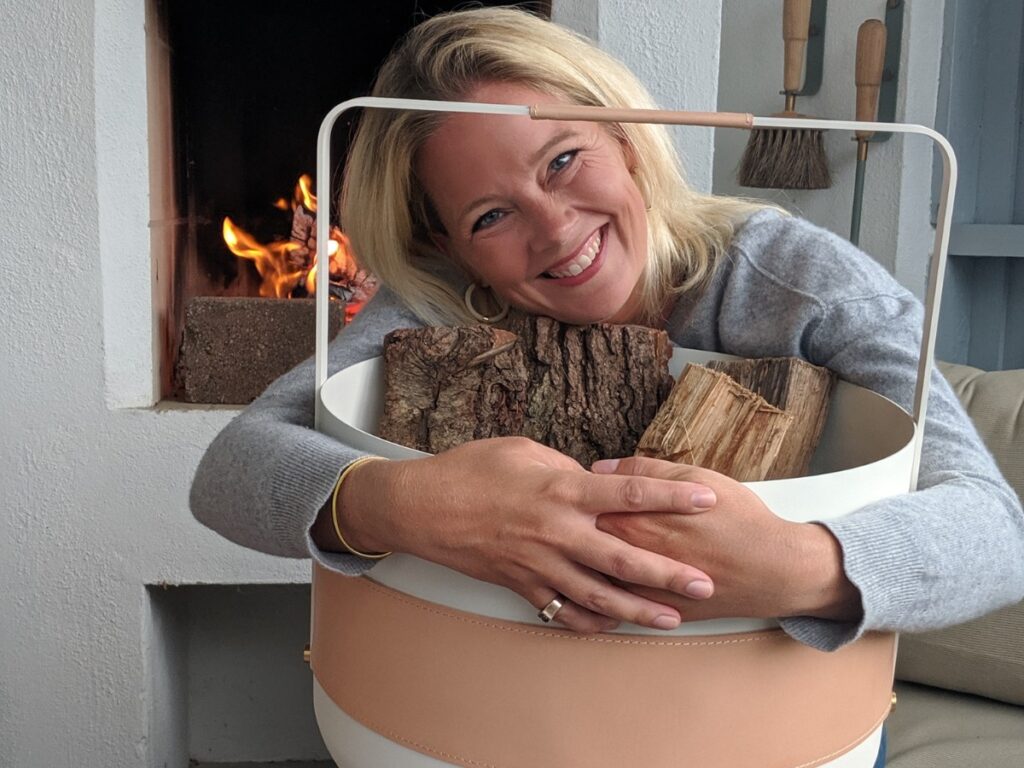
Over the past five years, Eldvarm has become a hearth and home for functional, high-design fireplace accessories. Now, founder Louise Varre sits down for a deeply personal interview to explain why she’s embracing editorial content and real-life encounters in a bid to draw people together around the fire.
On the other end of a glitchy phone line, in the middle of a Swedish snowstorm – and backdropped by the continuing fallout from a global pandemic that has forced us all apart – Louise Varre is talking about two things that seem regrettably remote: fire and the enduring human need for meaningful social contact. Louise has spent the past two years pondering this vast topic, which is close to her heart and key to the brave new vision that she has developed for her company, Eldvarm.
“From fireplace accessories, where we started, I want to grow the Eldvarm universe by looking at all these moments that we associate with being by the fire,” she explains. “What do we do by the fire? We connect, we tell tales, we read books. So can we publish stories? Can we recreate these connections through meetings and events, or even do trips around fire rituals? As long as we stay close to the topic of gathering by the fire and storytelling, the sky is the limit.”
Eldvarm’s trade shows have long been innately social affairs, with a third of their stands given over to a dedicated bar. These events have brought together many strangers and helped cement some of Louise’s own friendships. To foster these kinds of serendipitous encounters, and in tandem with her company’s new direction, at the end of this year, she’s planning to open a showroom and office in Paris – hopefully the first in a series of such sites worldwide. “I like to think of the space as a kind of laboratory for connections, where we’ll discuss topics around the fire with a researcher’s mindset.”
Louise founded Eldvarm in September 2014, after spotting a gap in the market for beautiful, functional fireplace accessories – an area which had been neglected by both traditional, often staid, fireplace companies, and the design world. Its range and repute have grown exponentially since then, but from a position of relative stability to boldly reconceiving its vision was by no means an easy leap: rare is the fireplace brand dabbling in anthropological realms or the world of storytelling.
The decision to redefine the company is both deeply embedded, and deeply personal: it comes, Louise reveals, after a period of intense reflection prompted by her brother Gustaf’s death, in 2018, at aged just thirty-four. In the period leading up to the funeral, she had already booked a work-trip to Los Angeles and decided to use her downtime to go on a pilgrimage to Joshua Tree, the small California high-desert town famed for its spiritual resonance.
“I got to do all this exploration, as though the whole grief thing had momentarily been put on pause,” she says. “I had this very strong yearning to come back to nature, so I did a sound bath, meditation – very much hippy stuff. I was on my own, not talking to anyone, and driving around with a lot of time to think. When I recalled how Gustaf had just got up in one day – it was his wedding anniversary, he dropped off his daughter at daycare, and he had all these plans that disappeared in an instant – I realised that I could no longer postpone what I wanted to do with my life. I had to do it now, which meant aligning my life purpose with my business.”
Defining the links between her company and wider mission was a feat in itself, but Louise managed to condense it to the open-ended premise “healing through connecting”. Ultimately, this meant helping to create the kind of eclectic encounters that she had long found transformative. “I’ve always been very sociable and loved random meetings, like on airplanes, for instance. Very often, you have completely honest conversations because you don’t know each other’s names – it’s this chance crossroads where people connect before heading off to different continents. Whether it’s having lunch with clients or meeting people at our exhibitions, I’m fascinated by going deep with strangers.”

The recent coronavirus pandemic, with its enforced social bubbles, put paid to such spontaneous encounters – but many people were already lonely before it. “I can see a big difference between Sweden and France, where I split my time,” says Louise. “In Sweden it’s very anonymous, we only go to big supermarkets, and elderly people can often get isolated. Whereas in France, I have all these interactions with my butcher, my fishmonger, my baker. I’ve really noticed how they affect my mood. It’s so important to feel like you’re a part of society, to feel like you belong, and that you’re seen.”
Fire – which is one of the cornerstones of humanity, and the reason why our hominin ancestors formed into mixed social groups in the first place – is an obvious conduit for this sense of belonging: not only was it the physical heart of what Eldvarm already did, it also offered the perfect metaphor for what it wanted to do. “The science journalist Gaia Vince was really the one who put the puzzle pieces together for me,” says Louise. “In her book Transcendence she explains how humans were born by the fire. It’s when interdependence started to become so important, and storytelling by the fire became this way to create trust and empathy, and to build connections.”
The roots of this development go back a million and a half years, making our move away from flames to electricity and central heating barely a blip on the timeline. Essentially, we are wired to unite and share stories. “Some scientists say that being connected to other human beings is the biggest drive we have for survival,” says Louise. “That’s why being rejected or feeling lonely is so physically painful.” We might not die of them today, she adds, but they have real consequences for our health, and there is evidence to suggest that even a brief but candid in-person chat with the postman can be more beneficial for reducing our cortisol levels and blood pressure than a video call with a loved one.
A lack of human contact reveals our vulnerability as a species – a quality that’s very much on Louise’s mind as she writes the next chapter of Eldvarm. In fact, vulnerability is one of the company’s new pillars – something Louise arrived at after sidelining branding agencies keen to steer her away from the commercially “risky” notion. Being open, she argues, is an essential part of any significant exchange: to connect you have to put yourself out there – which extends to sharing her own story. “It’s a bit scary, and I feel quite exposed because it’s so deeply personal, but it’s necessary to move the company in the direction I want,” she says. “Above all, I’m just very excited about this new phase.”
In the end, she says, the new direction is not a pivot but rather an expansion of what Eldvarm has already been doing – or, as she puts it, “another ring added to the tree”. Years ago, her friend Trisha came up with a poem-cum-position statement that sought to embody Eldvarm’s philosophy: “Keep the sparks flying / Keep the conversations flowing / Keep the ideas growing / Keep the fire going.” Varre only recently made the connection. “It’s funny,” she says. “We had that on our first catalogue, so it was there right from the beginning. I suppose it just took me some time to notice it and connect the dots.”


